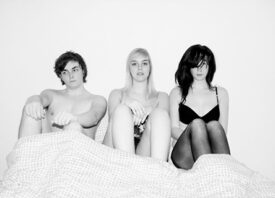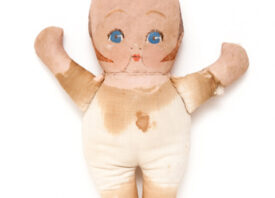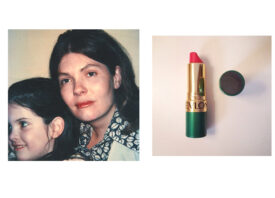Search this site
Photographer Revisits Her Failed Relationships in Self Portrait Series
You Who Never Arrived is photographer Jennifer McClure‘s intimate, evocative series in which she explores her past relationships by putting herself in front of the camera and in reimagined situations with past loves. With a deliberate intent to explore where her relationships may have gone wrong or her patterns within them, McClure restaged her memories in hotel rooms using ‘stand-ins’ to play the part of various partners. A truly brave project—and one executed beautifully—we recently asked McClure more about the experience of making the work and what she learned along the way.


What sparked the project for you? How strong was your desire to find out, as you say, where you were responsible in the meltdowns and patterns of your past relationships?
“The project started because I was obsessed with the short stories of Raymond Carver, especially those from What We Talk About When We Talk about Love. In “Gazebo,” a couple holes up in a hotel room to drink and discuss the status of their marriage and where things went wrong. I set out to recreate this specific story, but something changed as we began shooting. We shifted from acting as those characters to discussing our own relationships, histories, and insecurities. I was beginning something tenuous and new at the time, and I realized that I was bringing a lot of baggage to the table. I thought that dissecting all of my mistakes and patterns might keep me from repeating them.”


Tell us about the experience of restaging your memories in hotel rooms. Who were your stand-ins? How did the scenes unfold?
“Most of my relationships tended to be unlived in and impersonal, so hotel rooms were the perfect sets. I tried to match each location to the mood of the scene. I shot with friends and acquaintances (some of whom are actors), people who I trusted and who were willing to be open. I would explain to them the specifics of each situation and what role they were playing. We never planned on doing this, but inevitably we ended up talking to each other as our ‘characters’ while we shot. I got to say the things I never said, and I heard the words I never gave them a chance to say. It was an excruciating process that ultimately brought a lot of closure.”


What did you discover in the process and was it what you had thought it would be?
“I thought I was going to find out what was wrong with all of the men I dated. I had assumed that I was ready for a grown-up relationship and that I simply wasn’t choosing well. After hearing what all of the stand-ins had to say about my actions and my behavior, I saw that I always ran away when things started to get serious. I was afraid to let anyone get too close, and I much preferred fantasy over reality. I always shot before the men arrived (when I was still right) and after they left (when I was so very wrong). The most devastating photos to me are the ones I shot the mornings after.”


There’s something about the scenes you set that feel at once deeply personal and also universal—apart from the intimacy, there’s almost a cinematic quality to the work.
“I definitely drew from David Lynch, Stanley Kubrick, and Wong Kar-Wai when it came to color and lighting. I started out shooting at the Chelsea Hotel, which had huge rooms, and I lit with Chinese lanterns like the ones used in Lost in Translation. After the Chelsea closed I had to move to smaller rooms, but I tried to mimic that lighting as much as I could. I never storyboarded these or envisioned any particular single shot. They were all about a mood and an experience. I had an idea of what the hotel rooms might look like but the sets were always surprises. Each night was an intense improvisation. Though the narrative was loose, the fact that a bigger story was happening makes these feel like film stills.”








